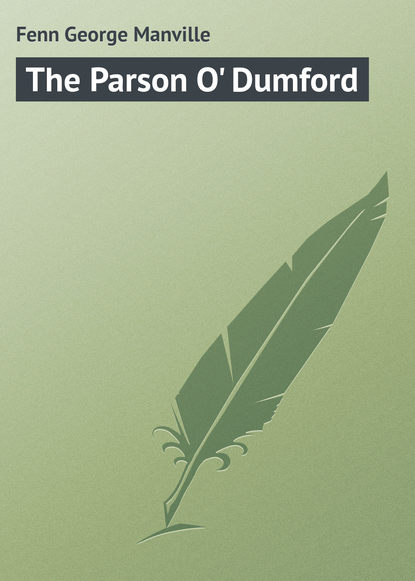По всем вопросам обращайтесь на: info@litportal.ru
(©) 2003-2025.
✖
The Parson O' Dumford
Настройки чтения
Размер шрифта
Высота строк
Поля
“Mrs Glaire?”
“Yes, the Missus. She sent for me to-day to speak to me about it.”
“What, about her boy coming after our Daisy?”
“About Mr Richard Glaire, maister o’ Doomford Foundry, taking a fancy to, and having matrimonial projects with regard to his foreman’s daughter,” said Joe, pompously.
“Well!” exclaimed Mrs Banks, eagerly; “and does she like it?”
“Well – er – er – er – she’s about for and again it,” said Joe, slowly.
“Now that won’t do, Joe,” exclaimed Mrs Banks. “You can’t deceive me, and I’m not going to be put aside in that way. I know as well as if I’d ha’ been theer that she said she didn’t like.”
“Well, what does it matter about what the women think? Dick – I mean Maister Richard Glaire’s hard after her.”
“And means to marry her?” said Mrs Banks.
“Marry her? Of course. Didn’t Baxter, of Churley, marry Jane Kemp? Didn’t Bill Bradby, as was wuth fifty thousand, marry Polly Robinson of Toddlethorpe, and make a real lady of her, and she wasn’t fit to stand within ten yards o’ my Daisy.”
“Yes, go on,” said Mrs Banks. “That’s your pride.”
“Pride be blowed, it’s only a difference in money. Richard Glaire’s only my old fellow-workman’s son, and Daisy’s my daughter, and I can buy her as many silk frocks, and as many watches, and chains, and rings as any lady in the land need have,” said Joe, angrily, as he slapped his pocket. “I ain’t gone on saving for twenty years for nowt. She shan’t disgrace him when they’re married.”
“Yes, Joe, that’s your pride,” said Mrs Banks.
“Go it,” said Joe, angrily, “tant away – tant – tant – tant. I don’t keer.”
“It’s your pride, that’s what it is. When she might marry a decent, honest, true-hearted lad like Tom, who’s worth fifty Richard Glaires – an insignificant, stuck-up dandy.”
“Don’t you abuse him whose bread you eat,” said Joe.
“I don’t,” said Mrs Banks. “It’s his mother’s and not his. I believe he soon wouldn’t have a bit for himself, if it wasn’t for you keeping his business together. Always sporting and gambling, and fooling away his money.”
“Well, if I keep it together, it’s for our bairn, isn’t it?” said Joe.
“And he’s no better than he should be.”
“You let him alone,” said Joe, stoutly. “All young men are a bit wild ’fore they’re married. I was for one.”
“It’s a big story, Joe,” said Mrs Banks, indignantly. “You wasn’t, or I shouldn’t ha’ had you.”
Joe winked at the clock again, and laughed a little inside as he unbuttoned another button of his vest – the second beginning at the top – to keep count how many cups of tea he had had.
“It’s my opinion,” said Mrs Banks, “that – ”
“Howd thee tongue, wilt ta?” cried Joe. “Here’s the lass.”
Daisy entered as he spoke, looking very pale and anxious-eyed, hastened through the kitchen, and went upstairs to take off her hat and jacket.
“Just you make haste down, miss,” said Mrs Banks, tartly.
“I don’t want any supper, mother,” said the girl, hurriedly.
“Then I want thee to ha’e some!” exclaimed Mrs Banks; “so look sharp.”
Daisy gave a sigh and hurried upstairs, and, as the door closed, Joe brought his hand down on the table with a thump that made the cups and saucers dance.
“Now, look here, old woman – that’s my bairn, and I wean’t have her wherrited. If she is – ”
“I’m going to say what’s on my mind, Joe, when it’s for my child’s good,” said Mrs Banks, stoutly.
“Are you?” said Joe, taking another cup of tea and undoing another button; “then so am I. Lookye here, my lass! I wouldn’t ha’ took a step to throw Daisy in young Maister’s way, but as he’s took to her, why, I wean’t ha’ it interfered wi’ – so now, then.”
“Don’t blame me, then, Joe; that’s all,” said Mrs Banks.
“Who’s going to?” said Joe. “So now let’s have none of your clat.”
Daisy came in then, and took her place at the table, making a very sorry pretence at eating, and only speaking in monosyllables till her mother pressed her.
“Did Mrs Glaire send you home with anybody?”
“No, mother.”
“Did you come home alone?”
“No, mother.”
“Humph: who came with you?”
“Tom, mother.”
Mrs Banks looked mollified, and Joe surprised.
“Has Miss Eve been playing to you, to-night?”
“No, mother.”
“What have you been doing then?”
“I – I – haven’t been at the House,” stammered Daisy.
Joe turned sharply round.
“Have you been a-walking with Tom, then?”
“No, mother, I only met him – coming home – and he walked beside me,” said the girl, with crimson cheeks.
“Theer, theer, theer,” said Joe, interposing, “let the bairn alone. Daisy, my lass, mak’ me a round o’ toast.”











